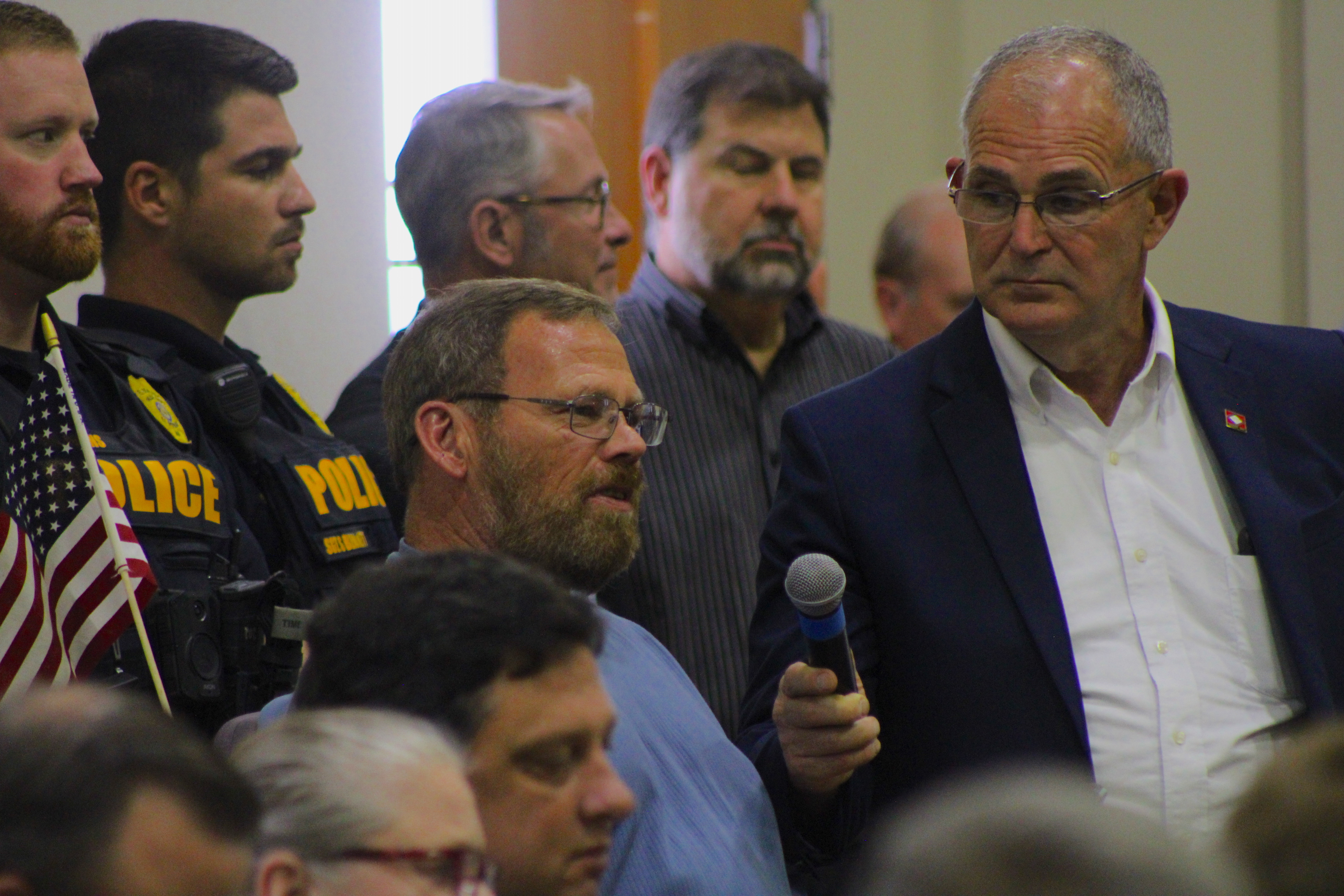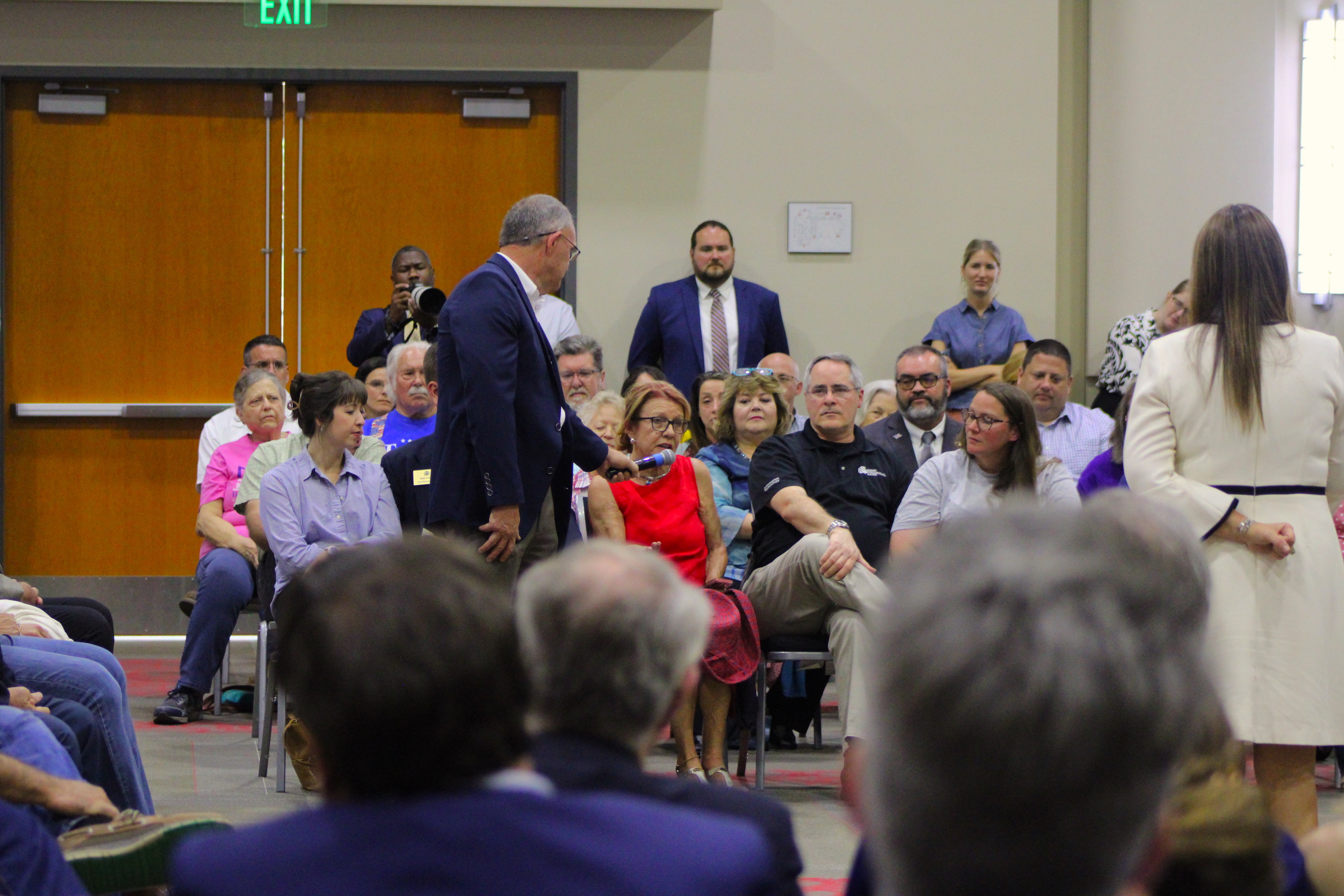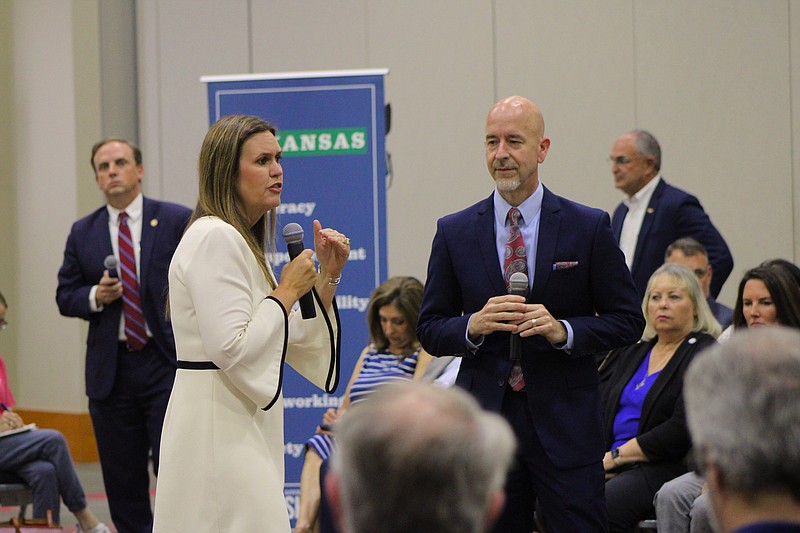About 100 south Arkansas residents, officials and education leaders gathered Tuesday evening at the El Dorado Conference Center for a town hall event meant to promote and provide information about Gov. Sarah Huckabee Sanders's signature education bill, the Arkansas LEARNS Act.
Sanders, in her second official visit to El Dorado since being elected, was joined by Arkansas Secretary of Education Jacob Oliva, as well as Arkansas Speaker of the House Matthew Shepherd, R-El Dorado, and state Sen. Matt Stone, R-Camden.
"I think Arkansas LEARNS is one of the most transformative pieces of legislation that, certainly, we've ever seen in the State of Arkansas, and I think one of the biggest education reform packages we've seen in the country, that will literally transform and change the lives of students across the state for the better," Sanders said.
Local residents were given the opportunity to ask questions about the LEARNS Act, which Sanders signed into law on March 8. She campaigned on overhauling education in the state, and the bill passed quickly through the state legislature during their regular session this spring.
The LEARNS Act amends various provisions of state law related to K-12 education. It raises minimum teacher salaries to $50,000 annually; provides $2,000 raises for teachers making over $48,000; creates Educational Freedom Accounts, a tax-dollar funded voucher program that will cover costs of private or home schooling.
The law also calls for literacy coaches, grants for families to pay for tutoring and a dual-diploma system for students learning a trade. Lawmakers additionally repealed the Teacher Fair Dismissal Act through LEARNS, making it easier for districts to fire teachers.
Shepherd, who introduced Sanders and Oliva, said Tuesday that the LEARNS Act tackles challenges related to education that are faced in south Arkansas.
"There are elements of the LEARNS Act that I can tell you, specifically are in there because of issues, concerns raised, right here in south Arkansas that we were able to address," he said.
Billy Joe Smith, a member of the Junction City School Board, was given the floor first once the governor began taking questions. Smith asked whether LEARNS is fully-funded, and how.
"Specifically, on the teacher pay raise, in two years, how will the district support this? It's really simple; the state is on the hook," Sanders answered, going on to say the $50,000 minimum teacher salaries are funded "in perpetuity."
"It's not something that ends in two or three years and then the district is on the hook for it; that is something that is fully-funded by the state," she continued.
Literacy coaches and reading grants will also be funded by the state, Sanders added. The bill was criticized before and after its passage due to uncertainty about how it would be funded. According to the Arkansas Dept. of Education, the LEARNS Act will cost $815.8 million in its first three-years, and is funded by "a mixture of existing state funds and federal grants."
Added Oliva, "Implementation is the number one priority, and the way the Legislature, kind of, put forth this vision, it will be self-sustaining over the next couple years, so that it will just be ongoing."
A local woman asked the pair next how the Educational Freedom Accounts will work for home schooled children.
"Home school families have the ability to opt in to the Educational Freedom Accounts if they choose to do so; it's certainly not required. But if a family decides that educating their kid at home is the best option for them and they would like to participate in Education Freedom Accounts, they can do so; however, there will be some accountability measures in place," Sanders answered.
Sanders said home schooled students would be subject to similar standards as private schools that participate in the voucher program. Specific standards for such schools have not been made yet, Oliva said, but the law does call for audits of private and homeschools and specifies what homeschool expenses are eligible for state funding.
The governor noted that home school parents will not be handed a blank check to spend however they like.
"It's not like the government is going to send that family a check, but we will cover things like curriculum, textbooks," she said. "It would actually have to be something that is specific for educating the child and the government would then cover the cost in that direction."
Oliva said the point of the vouchers is to give parents the flexibility to find a learning plan that best fits their children.
"If that school is not able to meet an individual's needs, the parents need to be empowered to have choices, and those choices need to be choices of quality, and those places need to have accountability around them, and that's what the LEARNS bill does," Oliva said. "There's going to be a lot of guardrails and rules developed around this."
Another local woman next asked about veteran teachers receiving the same pay as brand new teachers. Under the LEARNS Act, all teachers making under $50,000 will receive raises this year to the new minimum pay, or $2,000 raises if they were making more than $48,000, and it's up to districts to create salary schedules that provide extra pay to teachers who have worked longer.
"The other thing we did was remove one of the caps that used to exist at the state level, that (said) if a teacher had been there, I believe it was 15 years ... There was a cap at the district-level, not allowing the teachers to get additional pay raises; that's been removed, so now districts have complete flexibility on paying those veteran teachers," Sanders said.
Denny Rozenberg, superintendent of the Bearden School District, asked next whether positions at schools funded by federal COVID-19 relief would be able to be maintained through the LEARNS Act.
"When we put personnel in dollars we know are not renewing dollars, there's always risk to the school district. Those employees know that they're in a grant position, that is going to be continued based on eligible funding," Oliva answered. "We haven't gotten our final allocations from the federal government for the upcoming school year, so that's something we're considering continuing to monitor... But it doesn't mean we can't work with these school districts to make sure we get these budgets right for next year."
Oliva said he believes the LEARNS Act puts smaller districts, like Bearden, or in Union County, say Strong-Huttig or Junction City, on an even playing field with bigger districts.
"This is an investment in small and rural districts," he said. "We don't want to put any undue financial burden on any school district."
Jerrall Strasner, superintendent of the Ouachita River School District, said his staff is excited to implement the LEARNS Act. He asked how private schools receiving public money will be held accountable the way public school districts are.
"We want the public schools to be the first and best choice," Oliva answered. "As we look at providing more opportunities to families, it's targeted and incremental so we can monitor the data... To the accountability point, you're right; we're not going to create an opportunity for someone to set up a private school in somebody's shed... There's going to be hoops the private schools are going to have to jump through. They're going to have to be accredited; their students are going to have to participate in a standardized assessment. We're going to monitor whether or not they're being good stewards... and if there is a bad actor out there, we're going to shut them down and go after our investment."
Jeff Whitener, President of the Columbia Christian School Board, asked whether students would immediately be able to use vouchers at the private school and if in three years, any student would be eligible for a private school voucher.
Oliva said a restraining order currently blocking LEARNS's implementation has held up efforts to allow parents to begin seeking vouchers, but that by the time the school year starts, systems will be in place to allow eligible families to receive private school scholarships.
One man asked how the LEARNS Act will benefit exceptional students – "the leaders of tomorrow."
"We've got to stop focusing on remediation, but pushing acceleration and pushing the belief that these students are capable of meeting the expectations we set for them," Oliva answered. "There's plenty of students that need to be on an accelerated path... These students meet the expectations we set for them, and pushing accelerated opportunities is certainly something that we want to do."
He said a large number of schools in Arkansas don't offer courses like algebra, geometry and biology to younger students who are capable of the coursework, and sometimes students are denied transfer credit for work completed at one school, both issues he hopes to address in the next four years.
Other questions posed at the town hall dealt with a variety of subjects, from mental health care – which Oliva said is addressed in LEARNS through a requirement teachers get training in mental health awareness – to rural Internet services – which Sanders said the N in LEARNS covers through a commitment to ensure all students have broadband access -- to civics education.
"Every single day, I'm in the classroom watching these kids, some of them coming from backgrounds we can't even imagine, and how they can even think about not the law, but having somewhere to live, somewhere to eat, how to survive; but yet, they're still in there every single day, wanting to learn what it means to be a U.S. citizen," Joe Lawrence Jr., a civics teacher at Magnolia High School, said. "Come to the schools, see what we're doing... You will find out that there are some kids out there that are wonderful. There are kids that are struggling; we have to pull them all together."
El Dorado Schools Superintendent Jim Tucker said he's attended several LEARNS town halls, and Tuesday's didn't differ much. He said a recent visit by Oliva to El Dorado schools was productive.
"This is not the first town hall I've attended that Gov. Sanders presented at, and I think all of her answers held true to what she's said at previous town halls I've attended. I thought Jacob Oliva did a good job," he said. "He's very knowledgeable about education... He had good input and was very impressed with what we were doing. Not that that's anything against (former Sec. of Education) Johnny Key. I think Johnny did a great job – he was great at pulling people together and getting a common focus and goal... My hope is that Secretary Oliva has the same attitude, and I think he will."
 A local man asks about civics education during a town hall meeting on the Arkansas LEARNS Act. State Sen. Matt Stone is pictured holding a microphone. The town hall meeting gave south Arkansas residents the chance to ask Gov. Sarah Huckabee Sanders and Sec. of Education Jacob Oliva about the sweeping education overhaul. (Caitlan Butler/News-Times)
A local man asks about civics education during a town hall meeting on the Arkansas LEARNS Act. State Sen. Matt Stone is pictured holding a microphone. The town hall meeting gave south Arkansas residents the chance to ask Gov. Sarah Huckabee Sanders and Sec. of Education Jacob Oliva about the sweeping education overhaul. (Caitlan Butler/News-Times) State Sen. Matt Stone holds a microphone as a local woman asks Gov. Sarah Sanders about mental health care for students on Tuesday, during a town hall event held to discuss the Arkansas LEARNS Act. While most questions raised during the meeting centered on how the law is funded, some residents asked other questions, with topics ranging from mental health care to rural Internet service to civics education. (Caitlan Butler/News-Times)
State Sen. Matt Stone holds a microphone as a local woman asks Gov. Sarah Sanders about mental health care for students on Tuesday, during a town hall event held to discuss the Arkansas LEARNS Act. While most questions raised during the meeting centered on how the law is funded, some residents asked other questions, with topics ranging from mental health care to rural Internet service to civics education. (Caitlan Butler/News-Times)